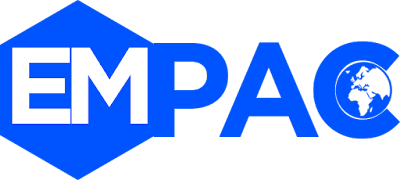CLICK HERE AND APPLY FOR ADMISSION
In the digital age, freelancing has emerged as more than just a side gig; it’s an avenue for professionals to fully embrace their skills, set their own hours, and take charge of their financial futures. Yet, with the ever-growing crowd of freelancers, how does one stand out and secure a niche in this competitive domain? The answer lies in comprehensive and focused training, and Empac’s Freelancing Course is tailored to offer just that.
Why Choose Empac’s
Freelancing Course?
Empowering Aspirants: Our course isn't just about imparting knowledge; it's about empowering
each individual. Empac believes in harnessing and amplifying the unique skills
of every learner, thus ensuring that our training isn’t a one-size-fits-all.
Practical Knowledge: With real-world examples, live projects, and a focus on current market
trends, Empac ensures that learners are not just theoretically sound, but are
also equipped to tackle real-world challenges.
Expert Mentors: Our panel consists of professionals who have not only thrived in the
freelancing world but have also made significant marks in their respective
niches. Their insights, experiences, and guidance are invaluable.
Community Building: When you enroll in Empac’s Freelancing Course, you're not just joining a
class; you're becoming a part of a thriving community. This network of fellow
learners and accomplished freelancers provides a supportive environment to
share, learn, and grow.
Course Highlights
1.
Introduction to
Freelancing: Understand the evolving dynamics of freelancing, its benefits, and its
challenges.
2.
Profile Creation
& Branding: Learn to market yourself effectively, making your profile a magnet for
potential clients.
3.
Client Management: From communication
strategies to handling disputes, this section delves deep into the nuances of
client relationship management.
4.
Financial Planning
& Pricing: Equip yourself with tools to set your pricing, manage your finances, and
understand the intricacies of freelancing taxes.
5.
Advanced Marketing
Strategies: Dive into advanced marketing tools to scale your freelance business and
attract a wider client base.
... and
many more modules that cover every aspect of freelancing, ensuring you're
industry-ready upon course completion.
The Empac Advantage
Our
commitment doesn’t end with course completion. Empac offers post-course
support, including mentorship opportunities, job placements, and access to an
exclusive alumni network that's always there to help.
Conclusion
With the
freelance industry booming like never before, now is the perfect time to equip
yourself with the necessary skills and knowledge. Empac’s Freelancing Course
promises not just education, but empowerment, ensuring you are ready to face
the dynamic and challenging world of freelancing. Embrace the Empac way of
learning and let us be the wind beneath your freelancing wings.
CLICK HERE AND APPLY FOR ADMISSION
For those eager to delve deeper, the detailed curriculum is provided
below.
1. Introduction to
Freelancing:
- What is freelancing?
- Why choose freelancing?
- Pros and cons of
freelancing
- Different freelancing
platforms: An overview
2. Getting Started:
- Identifying your skills
and niche
- Setting clear goals and
objectives
- Researching the market
and competition
3. Creating an
Impressive Profile:
- Profile photo and bio
dos and don'ts
- Crafting an engaging
summary
- Displaying your skills
and certifications
- Building a portfolio:
Importance and best practices
4. Pricing and Payments:
- Methods to set your
rates (hourly vs. fixed)
- Researching market
rates for your niche
- Managing expenses and
taxes
- Using invoicing tools
- Protecting yourself
from non-payment
5. Finding and Landing
Clients:
- Crafting winning
proposals
- Active vs. passive
client acquisition strategies
- Networking for
freelancers
- Effective communication
with clients
6. Delivering Quality
Work:
- Time management and
productivity tools
- Managing client
expectations
- Revisions and feedback:
Best practices
- Overcoming common
challenges in freelancing projects
7. Building Long-Term
Client Relationships:
- Importance of repeat
business
- Upselling and
cross-selling your services
- Seeking client
testimonials and referrals
8. Handling Disputes and
Conflicts:
- Common disputes and how
to prevent them
- Mediation and conflict
resolution skills
- When to walk away from
a problematic client
9. Legal and Ethical
Considerations:
- Creating and
understanding contracts
- Intellectual property
rights
- Data privacy and
security considerations
10. Growing and Scaling
Your Freelance Business:
- Branding yourself and
your services
- Passive income
opportunities for freelancers
- Diversifying income
streams
- Hiring subcontractors
or forming a team
11. Personal Well-being
and Mental Health:
- Work-life balance for
freelancers
- Handling stress and
avoiding burnout
- Building a support
network
12. Advanced Marketing
and Branding:
- Content marketing and
blogging for freelancers
- Leveraging social media
platforms
- Email marketing and
building a client list
13. Expanding Beyond
Traditional Freelancing:
- Moving into consulting
or agency work
- Teaching and mentoring
in your niche
- Launching products or
courses
14. Keeping Up with
Industry Trends:
- Continuous learning and
skill upgrading
- Attending webinars,
workshops, and conferences
- Staying updated with
changes in freelancing platforms and market demands





0 Comments